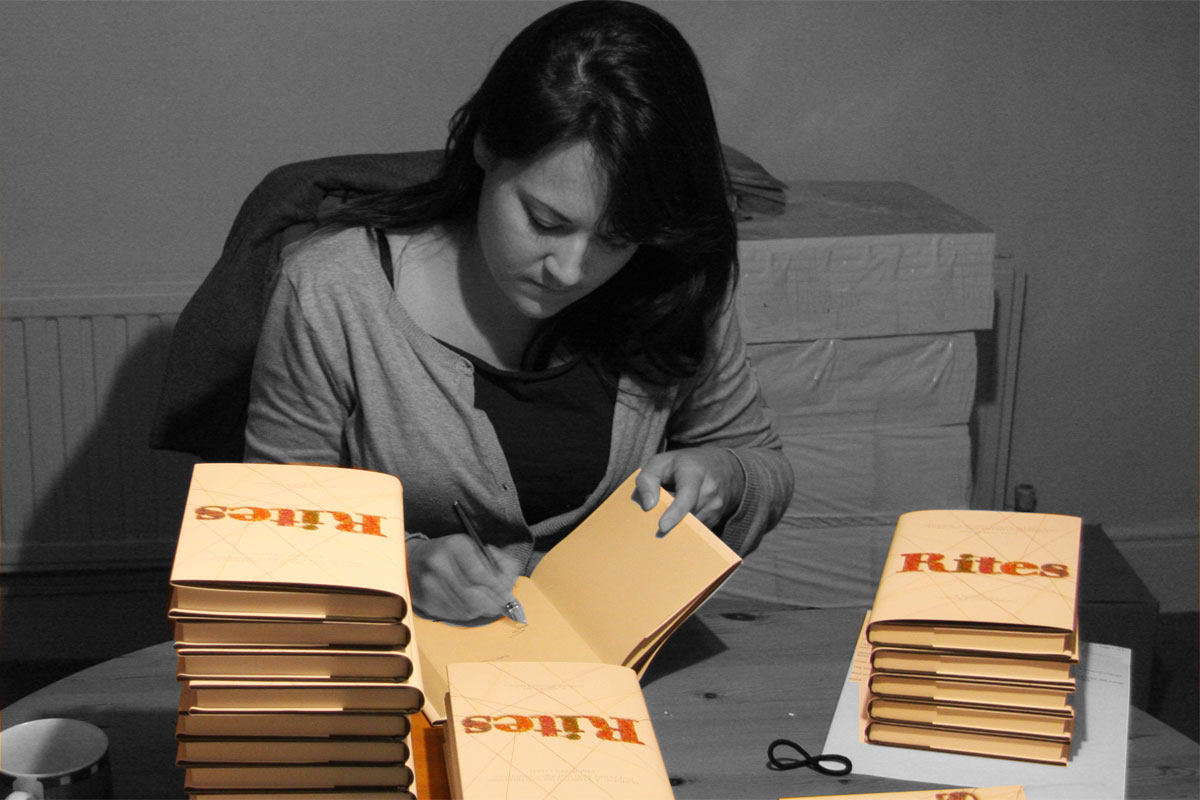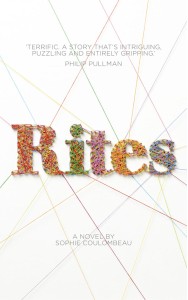Sophie Coulombeau interviewed about Rites by Rebecca Pedley, the Assistant Editor on Route’s Next Great Novelist award.Conducted in 2012.
Q. Where did your inspiration for the book come from?
A. Rites was in one way a slow burner that had been a long time coming – a sort of accumulated bundle of ideas and observations about love, friendship, belief, culpability and memory that I had been turning over in my mind for years. But in another respect it had a very quick and definite point of origin – an anecdote that someone told me, the central event of which was that somebody lost their keys, and the keys had a name and address written on them, and there were consequences. There was something about that image that just sent a little bit of a jolt through my mind. I went away and kept thinking about the keys. It seemed like certain concepts were associated with them. Abandon. Accident. Discovery. A phone call. Recrimination. Confusion. Things spiralling out of control. And suddenly there was this voice in my own head, a young man’s voice – precise, pedantic, slightly mocking – saying, ‘When I was fourteen, I did something terrible. At least, that’s what some people tell me.’ That narrative voice was Damien, one of the four protagonists, the one who starts the novel off. The rest followed from there.
The blurb of your book creates the impression that this book will cause controversy. Is this part of the intention of the book?
I’m not sure whether ‘controversy’ is quite the right word – I didn’t set out cynically to upset people or get them angry. But I definitely want it to make people think about the issues that it raises, and to redefine their values or beliefs a little bit as a result, and in comparison I don’t give a monkeys whether they ‘like’ it or not. I’ve always said that my dream for this book, rather than any particular good review or prize or sales figure, is that somewhere a bunch of people might be sitting around in a pub arguing about the book and the issues it raises, and that minds might be changed as a result. So far, the response has been great – many people have written to me saying that the book has troubled them, disturbed them, made them feel compromised or involved, kept them awake at night questioning things they had never questioned before. That’s absolute music to my ears.
You’ve chosen to write the book having many different narrators, was there any particular reason for this? Is this how the idea of confession came about in a non-religious sense?
Well, I started with Damien as a narrator and originally he was going to narrate the whole thing. But after about ten or twenty pages I hit a roadblock and couldn’t think of how he would continue the narrative – I knew I wasn’t done with him, but it was like he just wouldn’t play ball for a bit. I was sitting there feeling a bit frustrated with him and then a few conflicting ideas of how other people might see him – as irritating, as a victim, as unimportant, as rather magnificent – swam into my head and suddenly I thought, There are other people too! Very quickly the voices of Kathleen, Rachel and Father Creevey crystallised in my mind, and I started writing their stories, with an initial emphasis on how they saw the core incident of the book and what they thought of Damien, but gradually creating a whole reality and backstory for each character. So I guess that’s where the idea came from of not only a number of narrators, but also this kind of psychological reality in which they’re speaking to the reader directly – and uneasily aware that everybody else is too.
The idea of confession is at the very heart of the book – it was one of the ideas that had been bubbling away in my mind for years before I set pen to paper. I think that the notion of ‘sharing, purging, making clean’ (to paraphrase one of my characters) is one of the great imperatives of our time. I see it all around, even in a culture that has divested itself of much of its religious baggage – in the increased popularity of therapy or counselling as a panacea for problems, in the emphasis upon sharing and expressing in friendships and relationships, in the media’s obsession with scooping the stories and emotional outpourings of celebrities and those same celebrities’ obliging willingness to tell and emote. I was fascinated by the idea that this impulse is far bigger than the cultural or epistemological boxes that are used to contain it. So I knew that literal confession was going to have a big part to play in the narrative, and almost without knowing it I found my narrative reflecting that fact by itself becoming a series of confessions to the reader.
From having many different narrators, the story becomes quite tangled in what is the truth and what isn’t. Would you say the idea of truth is important within the book?
Yes, in that hopefully the book encourages the reader to be aware of the importance of subjectivity in the creation of what for convenience’s sake we have to call the truth. I am currently reading for my PhD in English Literature at the University of York, and I like to think that my novel reflects what I see as the mission statement of literary studies – the imperative to read texts critically. That’s more important to me than identifying a particular ‘truth’ that will solve the book like a riddle.
There is a strong theme of Catholicism within the book. Is this drawn upon personal experience? Are you catholic yourself?
I was raised as a Roman Catholic – the school, the church, the community, all that kind of thing – but I lapsed very strongly and quite uncomplicatedly when I was about fifteen or sixteen. I still retain a strong interest in Catholicism as a living institution, in an almost anthropological way, but there is no doubt in my mind that they – by which I mean the official line propagated by the Vatican – have almost everything completely and utterly wrong. About as wrong as it is possible to be. Which isn’t to say, oddly, that there aren’t some wonderful Catholics, and that faith can’t have some deeply beneficial consequences. That’s one of the exasperating paradoxes of organised religion, and something that the book explores.
The subject of rape comes up within your book. Did you find this a difficult subject to write about because it is such a delicate topic?
I wanted to use the idea of a rape accusation to explore issues about conflicting testimony and culpability because rape still seems to me to be a crime that, by its nature, is very badly catered for by our legal system. It comes down to one person’s word against another’s, and often the more articulate voice, or the person who is in a position of cultural power or prestige, will win out. Because of the fact that the case so often just comes down to testimony – and in their quest to make a good case, both sides will often rely on the ‘character’ of the people concerned, and there’s a can of worms – it seemed like the perfect forum in which to explore the question of how narrative modulates truth.
But yes, it was very difficult to write about, and I was terrified of getting it wrong in a way that might seem crass or dismissive. I did my very best to get the technical details right by conducting a lot of research, but the psychological reality of it – well, that’s where being a novelist comes in, I suppose. You just have to try to imagine it.
If someone was torn between your book and another one, what would you say to make them pick yours?
Philip Pullman likes it. Look, he said so on the cover. You think you know better than Philip Pullman?
Like in real life there are some people you like and some you dont… so do you have a favourite character from within the book? And if so, why?
Despite the fact I know he’s obnoxious and I deeply disapprove of him, I will always have a special place in my heart for Damien because he started the whole thing off, and without him there would never have been a Rites. But all the characters are me, really, at the same time as none of them are me, so it’s very hard to pick a favourite. It’s like asking whether you prefer your liver or your lungs.

